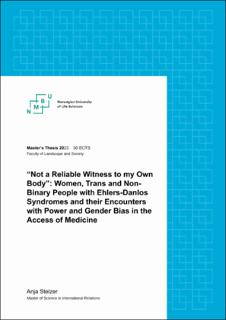| dc.description.abstract | “Western” Medicine is not, as commonly assumed, impartial but has been embedded with prejudice about the female body. Simultaneously, it has reinforced these myths by establishing theories about female biological inferiority to justify women’s oppression in society. Western medicine conceived the male body as the human ‘norm’ and ‘othered’ the female body, which still causes tangible impacts. This thesis explores the lived experiences of women, trans, and non-binary people diagnosed with Ehlers-Danlos Syndromes (EDS) – a group of connective tissue disorders – to analyse how they encounter power, gender bias, and intersectionality when accessing care. The thematic analysis is based on eleven semi-structured interviews. Six themes were identified: (1) Disease Burden, (2) Power in Accessing Medicine, (3) Assigned Female ‘Hysteria’, (4) Impact of Experiencing Bias, (5) Intersecting Identities and (6) Significance of Access. Power was a dominant thread in the lived experiences of the interviewees, particularly through the power/knowledge nexus. Patients’ increased access to collective knowledge through the internet and online patient spaces have shifted power/knowledge between patient and provider. The interviewees experienced gender bias in their medical encounters, where the hysteria discourse was especially relevant to their experiences. Female pain was disbelieved, trivialized, normalized, or attributed to mental health. This has led to negative psychological fallout and the experience of institutional betrayal. Furthermore, it led to diagnostic delays which worsened physical health. Intersecting identities impacted the experiences of the interviewees. Relevant categories were gender, ethnicity, class, sexuality, mental health status, disability, neurodiversity, body size, age and education. The effects of various systems of power and oppression were interrelated. Intersectionality also influenced the interviewees’ access to health insurance, care and diagnosis. To improve female health in Western medicine, pervasive beliefs about ‘hysterical women’ whose sole purpose lies in bearing children must be deconstructed. Lastly, there needs to be a better understanding of the normalizing power that Western medicine has on our society. | |
